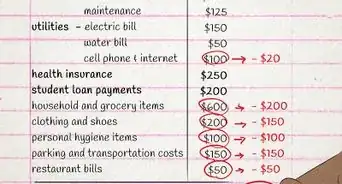This article was written by Moshe Ratson, MFT, PCC and by wikiHow staff writer, Hannah Madden. Moshe Ratson is the Executive Director of spiral2grow Marriage & Family Therapy, a coaching and therapy clinic in New York City. Moshe is an International Coach Federation accredited Professional Certified Coach (PCC). He received his MS in Marriage and Family Therapy from Iona College. Moshe is a clinical member of the American Association of Marriage and Family Therapy (AAMFT), and a member of the International Coach Federation (ICF).
There are 11 references cited in this article, which can be found at the bottom of the page.
This article has been viewed 16,125 times.
When you’re dealing with problems in your marriage, it can sometimes feel like you’re all alone. Fortunately, there are many ways you can communicate with your spouse and come up with solutions to solve your problems together. We’ve compiled a list of ways you can cope with your marriage problems to talk with your partner and work toward fixing your relationship, one step at a time.
This article is based on an interview with our licensed marriage and family therapist, Moshe Ratson, MFT, PCC. Check out the full interview here.
Steps
Communicate about issues in your relationship.
-
Open communication is the key to any healthy relationship. You and your partner need to talk about any struggles you’re going through.[1] X Expert Source

Marriage & Family Therapist Expert Interview. 18 September 2019. When you let things go or assume they’ll get better on their own, they tend to fester, which can lead to resentment over time. When you notice issues cropping up, sit your spouse down and talk with them about it.[2] X Expert Source
Licensed Marriage & Family Therapist Expert Interview. 14 May 2019.- You can bring up issues in the relationship by saying something like, “Hey honey, could we sit down and talk later this evening? I have a few things I’d like to chat with you about, just to make sure we’re on the same page.”
- To avoid putting your spouse on the defensive, use “I” statements. [3]
X
Expert Source

Marriage & Family Therapist Expert Interview. 7 August 2019. For instance, instead of saying, “You always come home late,” you might say, “When you stay out late without telling me where you’re going, I feel worried.”
Focus on one issue at a time.
-
Bringing up all your problems at once can feel overwhelming. When you sit down with your partner to chat about what you’re struggling with, try to pick one thing to talk about at a time. That way, you can dig deep into a specific issue instead of generalizing about a ton of things at once.[4] X Research source
- For example, if you want to talk about your intimacy (or lack thereof) but also about your stress levels, pick one and save the other for a different time.
Try to understand your partner’s perspective.
-
Listen closely, and try not to interrupt. Your partner probably has their own view of what’s going on in your marriage. Do your best to see things from their perspective, and don’t dismiss how they’re feeling right away. If you try your best to be understanding, you two can have better, more productive conversations.[5] X Expert Source

Licensed Certified Social Worker – Clinical Expert Interview. 15 October 2021.- Show that you’re listening to your partner by asking follow-up questions like, “Interesting. Can you tell me more?” or, “I’m not sure I understand. Could you explain that again?”
Come up with solutions together.
-
The goal is to reach a decision that benefits both of you. Even if it’s an issue that only one of you is having, you should try to reach a win-win solution: something that makes you both feel like you’re improving your relationship and growing closer together.[6] X Expert Source

Marriage & Family Therapist Expert Interview. 18 September 2019. This may take a little while, and you might have to talk multiple times with your spouse, but in the end, it will be worth it.[7] X Research source- For instance, if the issue is that you feel you do more chores around the house than your spouse does, you might create a chore list that you both work on throughout the week. That way, you can both see how many chores the two of you are doing, and you both feel like you’re equally contributing to the household.
Accept the things you can’t change about your partner.
-
There may be recurring issues that crop up over time. This can sound like a red flag, but in reality, it’s normal for most long-term relationships. You and your partner will probably disagree about similar things a lot, and that’s okay. The important thing is that you stay respectful and kind when addressing these disagreements, whether it’s the first time or the fiftieth time.[8] X Research source
- For example, maybe you like to clean up the house at the end of each day, while your partner prefers to do a big cleanup at the end of the week. You two might discuss this a lot over your relationship, but it’s not necessarily a bad thing—it’s just a difference in preferences.
Forgive your partner if you can.
-
Hanging onto anger and resentment isn’t great for your marriage. If you feel hurt or mad at your partner still, work on forgiving them for the past. Make sure you’ve fully talked through the issue, and try to get a sincere apology from your partner, if they’re willing. Then, you can choose whether or not you can forgive your spouse to keep the relationship moving forward.[9] X Research source
- Remember that forgiveness isn’t telling your partner that their actions are okay—it’s allowing yourself to move on instead of hanging onto old feelings.
Divide household tasks.
-
Division of labor is a huge point of contention in most relationships. Often, both partners feel like they’re doing all the work, so they start to get resentful. Sit down with your spouse and talk about who does what around the house, and make some changes if there are any issues.[10] X Research source
- It might help to make a list of what the both of you do day by day. That way, you can see how many tasks each of you are doing throughout the week.
Talk about your parenting styles.
-
How you raise your children is very important to talk about ahead of time. Sit down with your spouse and discuss the specifics of what you’d like to do with your children, and how you’ll do it. Even if you don’t agree 100%, it’s important to be on the same page, at least about bigger issues.[11] X Research source
- You could say something like, “I think it’s important that we talk about how we’ll raise our child. Do you want to discuss some things with me?”
Show love to your partner every day.
-
Express your appreciation for your partner whenever you can. Give your partner a hug when you get home, pick them up a snack when you’re at the store, or send them a sweet text while you’re at work. These small acts of love might not seem like much, but they can remind you why you fell in love in the first place.[12] X Expert Source

Licensed Marriage & Family Therapist Expert Interview. 14 May 2019.- It helps if you know your partner’s love language. For instance, if their love language is physical touch, they might appreciate a shoulder rub or a massage. Or, if their love language is acts of service, you might do some chores around the house.
Make romance part of your daily life.
-
Act like you’re dating your spouse again to bring the spark back. When you get overwhelmed with work, kids, and responsibilities, it’s easy to let romance fall by the wayside. Try your best to be romantic toward your partner so you both remember what it felt like when you first started dating.[13] X Expert Source

Marriage & Family Therapist Expert Interview. 18 September 2019. You could:[14] X Expert Source
Marriage & Family Therapist Expert Interview. 7 August 2019.- Have breakfast in bed together
- Surprise your partner with small gifts
- Plan a weekend getaway trip
- Give your partner compliments
- Have a candlelit dinner at home
Remind yourself of your partner’s positive qualities.
-
It can be easy to focus on the negatives in your relationship. Instead, try to come up with a few positive things that your partner does: maybe they’re awesome at organizing, or maybe they are super handy around the house. Whatever it is, no matter how small, keep those things in mind as you examine your marriage and your relationship.[15] X Research source
- If it helps, you could even make a physical list on paper to look at every time you need a pick-me-up. For instance, your list might say: makes me breakfast on Sundays, is a great parent, is very patient with the kids, is an awesome cook.
Work on yourself.
-
Examine your own contributions to any issues in the relationship.[16] X Expert Source

Marriage & Family Therapist Expert Interview. 18 September 2019. It takes two to tango, just like it takes two to make a marriage work. Even if you feel like you’re completely in the right, try to look at it from your partner’s perspective. Then, you can start implementing small changes in yourself that will lead to bigger changes overall.[17] X Research source- For instance, if you and your spouse often fight when you have to stay late at work, you may be dedicating too much time to your job and not enough time for your spouse. You could work on that by reevaluating your schedule and prioritizing quality time with your partner.
Commit 100% to your spouse.
-
Make sure you’re fully invested in making your marriage work. If you have one foot out the door already, your marriage problems will probably only get worse. Instead, tell yourself to try everything to fix your relationship, no matter what the outcome is. If you dedicate yourself to trying in your marriage, you’re much more likely to get to a healthy, happy place.[18] X Research source
- It’s not uncommon to start looking for a “way out” of the marriage when things get tough. Keep in mind, though, that almost all long-term relationships go through rough patches at one point or another, and most of them make it through to the other side.
Focus on other things that make you happy.
-
If you can’t find happiness in your marriage right now, find it in your hobbies or friends. Marriages sometimes go through rough patches, and that’s okay. Try to spend more time doing things you love, like hanging out with close friends, diving into hobbies, and getting out into nature. Try not to ignore your responsibilities or your home life (don’t leave your spouse to take care of the kids every weekend), but inject a little fun into your routine to make your life easier.[19] X Research source
- You can also focus on self-care and do things that don’t take much time at all. Spend 10 to 15 minutes soaking in a bubble bath, reading a good book, taking a walk, or listening to music.
Go to couple’s counseling if you need to.
-
Some marriage problems are hard to fix on your own. A mental health professional can help you both understand each other better and come up with solutions that work for the both of you. If you’ve tried a few things and nothing is working, reach out to a professional and make an appointment.[20] X Trustworthy Source Johns Hopkins Medicine Official resource database of the world-leading Johns Hopkins Hospital Go to source
- A couple’s counselor can also give you real, concrete tips to help you work through your specific problems as a couple.
You Might Also Like

 What to Do If Your Husband Is Texting Another Woman (And Should You Confront Her?)
What to Do If Your Husband Is Texting Another Woman (And Should You Confront Her?)
 11 Tips for Going through a Marriage Separation While Living Together
11 Tips for Going through a Marriage Separation While Living Together



 How to Fix a Marriage After a Sexting Affair
How to Fix a Marriage After a Sexting Affair







References
- ↑ Moshe Ratson, MFT, PCC. Marriage & Family Therapist. Expert Interview. 18 September 2019.
- ↑ Jin S. Kim, MA. Licensed Marriage & Family Therapist. Expert Interview. 14 May 2019.
- ↑ Moshe Ratson, MFT, PCC. Marriage & Family Therapist. Expert Interview. 7 August 2019.
- ↑ https://smartcouples.ifas.ufl.edu/media/smartcouplesifasufledu/docs/pdfs/10-Rules-for-Constructive-Conflict.pdf
- ↑ Raffi Bilek, LCSW-C. Licensed Certified Social Worker – Clinical. Expert Interview. 15 October 2021.
- ↑ Moshe Ratson, MFT, PCC. Marriage & Family Therapist. Expert Interview. 18 September 2019.
- ↑ https://smartcouples.ifas.ufl.edu/media/smartcouplesifasufledu/docs/pdfs/10-Rules-for-Constructive-Conflict.pdf
- ↑ https://smartcouples.ifas.ufl.edu/married/coping-with-problems-and-challenges/coping-with-change-in-your-marriage/
- ↑ https://www.gottman.com/blog/10-things-try-giving-marriage/
- ↑ https://ideas.ted.com/how-to-split-the-chores-with-your-partner-minus-the-drama-and-fighting/
- ↑ https://www.parentingcounts.org/wp-content/uploads/2020/11/information-for-parents-parenting-styles.pdf
- ↑ Jin S. Kim, MA. Licensed Marriage & Family Therapist. Expert Interview. 14 May 2019.
- ↑ Moshe Ratson, MFT, PCC. Marriage & Family Therapist. Expert Interview. 18 September 2019.
- ↑ Moshe Ratson, MFT, PCC. Marriage & Family Therapist. Expert Interview. 7 August 2019.
- ↑ https://www.gottman.com/blog/10-things-try-giving-marriage/
- ↑ Moshe Ratson, MFT, PCC. Marriage & Family Therapist. Expert Interview. 18 September 2019.
- ↑ https://smartcouples.ifas.ufl.edu/married/coping-with-problems-and-challenges/coping-with-change-in-your-marriage/
- ↑ https://smartcouples.ifas.ufl.edu/married/coping-with-problems-and-challenges/coping-with-change-in-your-marriage/
- ↑ https://psychcentral.com/blog/how-to-survive-in-an-unhappy-marriage-and-thrive#survival-tips
- ↑ https://www.hopkinsmedicine.org/health/wellness-and-prevention/could-your-marriage-benefit-from-counseling
About This Article




























































